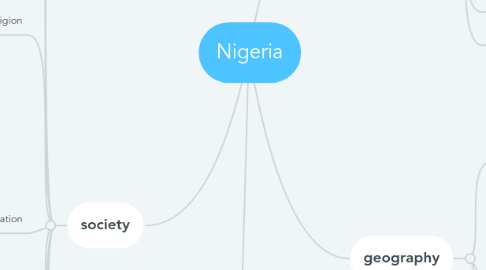
1. society
1.1. ethnicities
1.1.1. e.g. Yoruba
1.1.2. Hausa
1.1.3. Igbo
1.1.4. language
1.1.5. ethnic division
1.1.6. ethnic tensions
1.2. family
1.2.1. patriarchal family structure
1.2.2. modern family structure
1.2.3. the importance of family
1.3. women
1.3.1. gender stereotypes
1.3.2. gender - based violence
1.3.2.1. culture of silence
1.3.2.2. domestic violence
1.3.2.3. child marriage
1.3.2.4. pressure to conform to other people's expectations
1.3.2.5. divorce and its impact
1.3.3. underrepresentation / representation
1.3.3.1. Nollywood
1.3.3.2. politics
1.3.3.3. workforce
1.3.4. turning down of gender equality bill in 2016
1.4. religion
1.4.1. religions and faiths
1.4.1.1. Christianity
1.4.1.2. Traditional African Religions
1.4.1.3. Islam
1.4.2. influence on Nigerians
1.4.2.1. role of religious leaders
1.4.2.2. shaping beliefs & convictions in country
1.4.2.3. religious ideologies
1.4.3. issues & conflicts
1.4.3.1. patriarchal system
1.4.3.2. violence towards women
1.5. education
1.5.1. aspirations
1.5.2. prestige
1.5.3. emigration to UK / EU/ USA
1.5.4. unequal opportunities
1.6. poverty
1.6.1. gap between rich and poor
1.6.2. slums (e.g. in Lagos)
1.6.3. corruption
1.6.4. unequal opportunities
1.6.5. contrast between strength of economy and living conditions of majority
1.7. criminality
1.7.1. terrorism: Boko Haram
1.7.1.1. North of Nigeria
1.7.1.2. attacks & kidnappings
1.7.1.3. fight against Westernization
1.7.1.4. migration / displacement
1.7.1.5. connection to ISIS / ISIL
1.7.2. corruption
1.7.2.1. bribery
1.7.2.2. money laundering
1.7.2.3. involvement of government, police or other authorities
1.7.2.4. severity of problem in Nigeria
1.7.2.5. culture of impunity & tolerance by society
1.7.2.6. insufficient healthcare, infrastructure, education
1.7.3. trafficking
1.7.4. attacks e.g. on oil infrastructure
1.7.5. ...
1.8. Postcolonialism
1.8.1. impact of colonisation on Nigeria
1.8.2. aspects of postcolonialism
1.8.3. aspects of neocolonialism
1.8.4. Westernization
1.8.5. clash of cultures
1.8.6. cultural traditions (e.g. festivals)
1.9. artists
1.9.1. celebration of African culture
1.9.2. agency over depiction of Africa / Nigeria
2. history
2.1. important historical events
2.1.1. 18th century: Colonisation by the British
2.1.2. The role of slavery
2.1.3. Early 19th century: War between Hausa and Fulani people, establishment of separate Muslim empire in the north
2.1.4. Britain's Royal Niger Company
2.1.5. End of 19th century: Expansion of British control, division between Christian south and Muslim north → ethnic tensions
2.1.6. 1956: discovery of oil in Nigeria
2.1.7. 1960: Nigerian independence
2.1.8. 1967-1970: The Biafran War
2.1.9. 1975-2003: alternating periods of democratic and military governments (military coups)
2.1.10. The present
2.2. important phases
2.2.1. The pre-colonial era
2.2.2. Colonialism
2.2.3. Postcolonialism
2.2.4. Neocolonialism
3. geography
3.1. population
3.1.1. population growth
3.1.2. challenges associated with population growth
3.1.3. age
3.1.4. emigration
3.2. infrastructure
3.2.1. lack of infrastructure
3.2.2. corruption
3.2.3. difference between rural and urban areas
3.3. challenging diversity
3.3.1. boundary between North and South
3.3.2. abundant reserves of oil and natural gas in Niger delta region
3.3.3. geographical distribution of different ethnic groups
4. economy
4.1. oil
4.1.1. contribution to GDP, government income and export revenues
4.1.2. dependence on oil
4.1.3. oil & corruption
4.1.4. environmental impact
4.1.5. Western influence and involvement
4.2. Nollywood
4.2.1. generated revenue
4.2.2. cultural contribution
4.2.3. importance of employer

